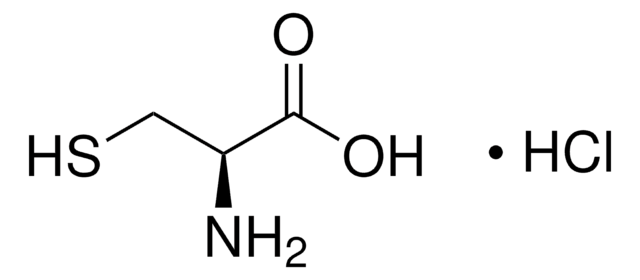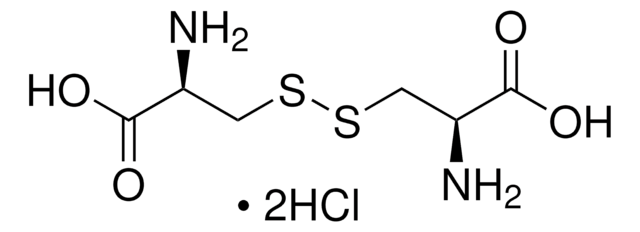C6852
L-Cysteine hydrochloride monohydrate
98.5-101.0% dry basis, suitable for cell culture, non-animal source, meets EP, USP testing specifications
Synonym(s):
L-Cysteine hydrochloride hydrate (1:1:1)
About This Item
Recommended Products
Product Name
L-Cysteine hydrochloride monohydrate, from non-animal source, suitable for cell culture, meets EP, USP testing specifications
biological source
non-animal source
Quality Level
Agency
meets EP testing specifications
meets USP testing specifications
Assay
98.5-101.0% dry basis
form
powder or crystals
optical activity
[α]20/D 6.1 to 7.8°, c = 8 in 1 M HCl
[α]25/D 5.7 to 6.8°, c = 8 in HCl (6 N)
technique(s)
cell culture | mammalian: suitable
impurities
endotoxin, tested
color
white
solubility
water: 1 g/10 mL, clear, colorless
cation traces
Fe: ≤10 ppm
NH4+: ≤0.02%
application(s)
pharmaceutical (small molecule)
functional group
(sulfhydryl)
storage temp.
room temp
SMILES string
O.Cl.N[C@@H](CS)C(O)=O
InChI
1S/C3H7NO2S.ClH.H2O/c4-2(1-7)3(5)6;;/h2,7H,1,4H2,(H,5,6);1H;1H2/t2-;;/m0../s1
InChI key
QIJRTFXNRTXDIP-JIZZDEOASA-N
Looking for similar products? Visit Product Comparison Guide
Related Categories
General description
Application
Biochem/physiol Actions
Features and Benefits
- Suitable for Cell Culture and Biochemical research
- High-quality compound suitable for multiple research applications
Other Notes
comparable product
Storage Class Code
11 - Combustible Solids
WGK
WGK 1
Flash Point(F)
Not applicable
Flash Point(C)
Not applicable
Personal Protective Equipment
Choose from one of the most recent versions:
Already Own This Product?
Find documentation for the products that you have recently purchased in the Document Library.
Customers Also Viewed
fragments by third generation intracellular
antibody capture
Articles
Antioxidants protect biological systems from oxidative damage produced by oxygen-containing free radicals and from redoxactive transition metal ions such as iron, copper, and cadmium.
Our team of scientists has experience in all areas of research including Life Science, Material Science, Chemical Synthesis, Chromatography, Analytical and many others.
Contact Technical Service









